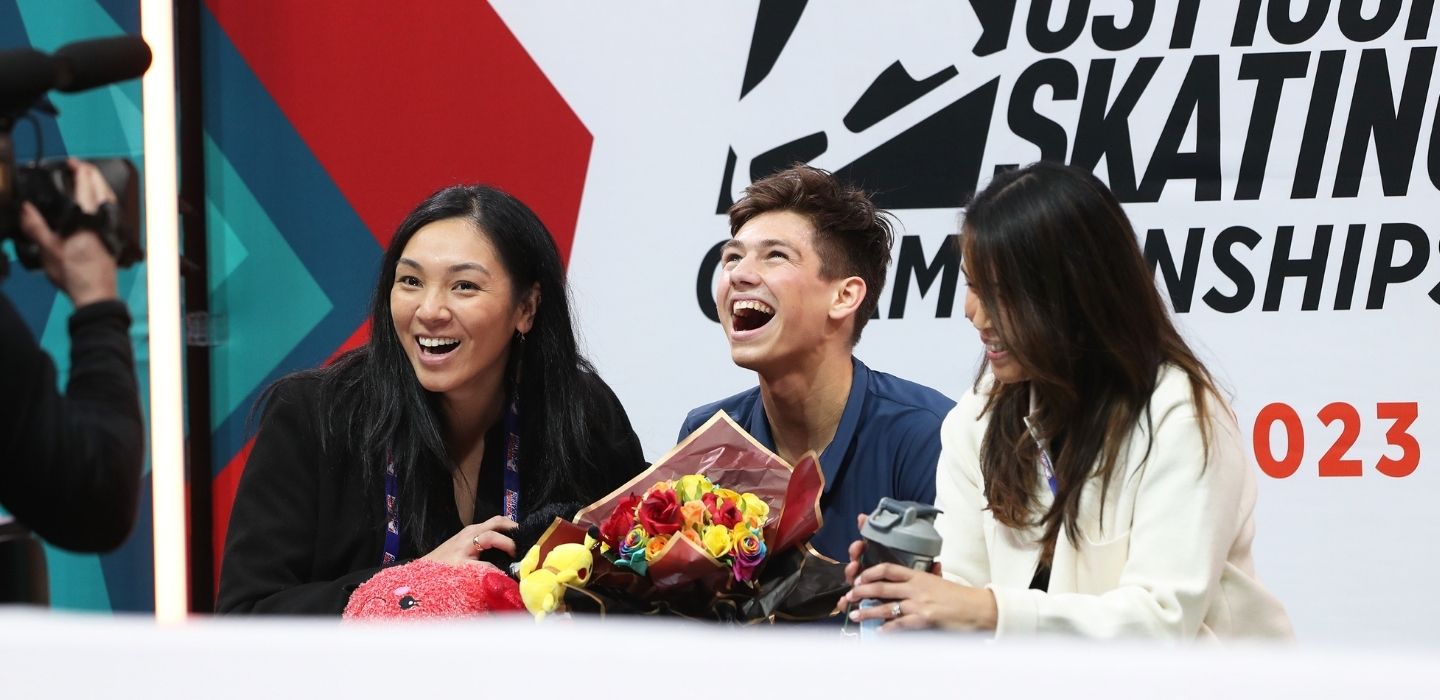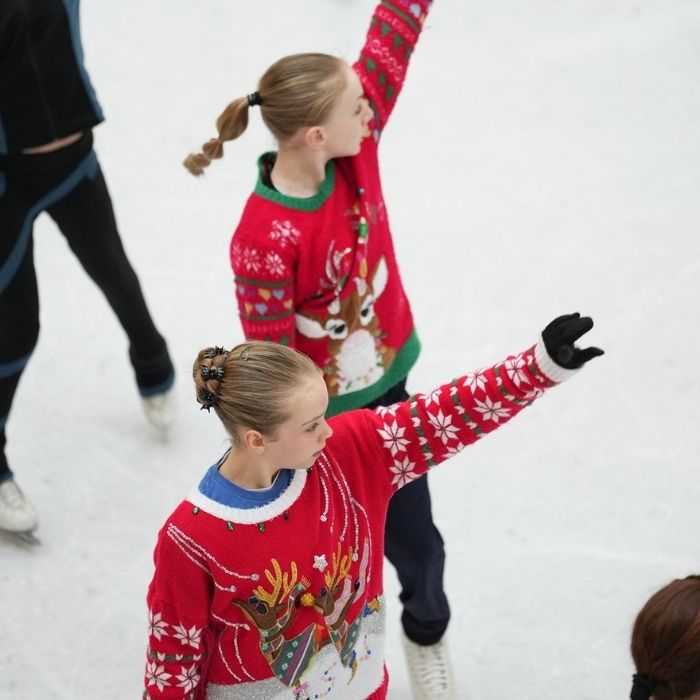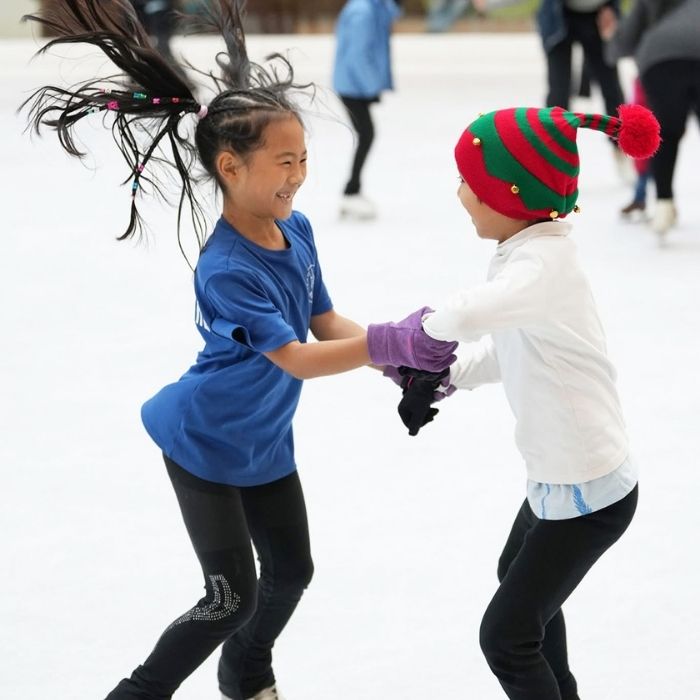WINTER 2025
Dreams on Ice
How one alum is helping put Oregon figure skaters back on the map.
- Story by Cheston Knapp

Photo credit: Melanie Heaney
IT'S A MORNING in mid-December and Mari Malama ’10 is helping a handful of young figure skaters with a sticky piece of choreography. They’re all wearing kitschy Christmas sweaters and the girls have their hair pulled back so tight they appear mildly astonished. Today’s the dress rehearsal for next week’s Holiday Ice Show at the Lloyd Center, a celebration that will feature skaters from four clubs around Portland, including around fifty from AXIS ON ICE, the company Mari runs with her sister, Nani. Founded about a decade ago, it has grown into one of the most competitive outfits in town. What sets it apart is that it’s also one of the most supportive.
“Family is always first,” Mari told me on a previous visit. “And we bring that to the skating. We have certain standards that we try to uphold. It’s more important to us that we’re building good people, not just good skaters.”
This turns out to be something of a revolutionary idea in the figure skating community, where coaches have tended to focus on developing only those skaters with the innate potential to reach the highest levels of competition. Mari and Nani wanted to build something that was more democratic and accessible.
“More athletes are excluded in that old model,” Mari said. “And we wanted to make sure we’re taking care of everyone and providing paths for all levels to improve.”
The air inside the Sherwood Ice Arena, AXIS’s homebase, is so cold you can feel yourself breathing. Milk wouldn’t spoil in here. The rink teems with skaters, who appear to be grouped together by skill level. Mari leads her huddle in a kind of hokey pokey, going through the moves slowly, deliberately. Choreography is her bread and butter and for next week’s performance she and her team have put together nine numbers. The pod sashays across the ice, making expansive gestures with their hands—they look as though they’re giving a tour of an imaginary palace.
Mari’s long black hair is gathered into a loose ponytail that hangs down the back of her oversize puffer jacket. She’s Hawaiian and grew up skating at a rink in Honolulu. As an athlete, she was often in her older sister’s shadow. Nani was a trailblazer for Hawaiian skaters, training at the highest level. Competitive figure skating is expensive, though. Mari’s mom worked as a waitress and had four kids—she could only manage to support one elite skater, and even that required help from generous members of their community. But Mari learned a lot from watching her sister perform.
While Mari’s career as a coach seems like a natural outgrowth of her experience as a kid, it wasn’t always the plan. When she enrolled in University of Portland’s honors program, she was dead set on becoming a doctor. She double-majored in biology and biochemistry and, after graduation, became a medical scribe, where she learned the ins and outs of the profession. She coached throughout this experience, though, choosing to work the night shift because it freed up time for her skaters. Very long days and little sleep were the cost for being able to have her cake and eat it, too. As her self-imposed deadline to apply for medical school approached, she started to have doubts. Did she still want this future? After a tough period of deliberation, she made the decision to pursue coaching full-time. And she hasn’t looked back.

Photo Credit: Mike Rodgers

As Mari glides from group to group, offering pointers and ironing out elements of the show, I spot one of AXIS’s oldest skaters, a young man of around twenty. He’s whipping around the outer edge of the ice and has an undeniable presence out there. He rises off the ice and performs an elegant split jump. Moments later, full of speed, he kicks the ice and corkscrews through the air, landing with improbable ease. I know enough to think: lutz, axel, loop, salchow. But language only ruins the mystery. What’s clear is that when he jumps, he jumps for joy. This is Samuel Mindra.
“If you want to reach the top-top, it takes a lot of time and energy and attention,” Mari told me. “With Samuel, it was a gift.” You can’t tell Mari’s story without Samuel. They met more than a decade ago, when Mari was giving lessons at the Lloyd Center. Only ten years old then, Samuel had an undeniable spark, one that Mari sensed could be nurtured into a flame. As Samuel continued to improve under her aegis, rising in the national ranks, Mari worried that she couldn’t give him everything he needed to succeed at the next level. She arranged a trip to California for Samuel to meet Rafael (“Raf”) Arutyunyan, who has coached Olympic champions like Nathan Chen. Mari thought this would be the end of their time together. But both Raf and Samuel insisted she stay on. Naturally humble, Mari has had to learn to be as confident as she has every right to be.
“As a coach, you have to keep improving, too,” she said.
On the ice, Samuel crosses his arms across his chest and starts to spin, increasing in speed until he’s a blur. He looks like a drill bit trying to find purchase. Along with a handful of other elite skaters, Samuel is changing the landscape of figure skating in Oregon. Having guided a number of these athletes to the elite level, Mari continues to prove that her boldest dreams have always been set on ice.
CHESTON KNAPP is Portland magazine’s senior writer and associate editor.